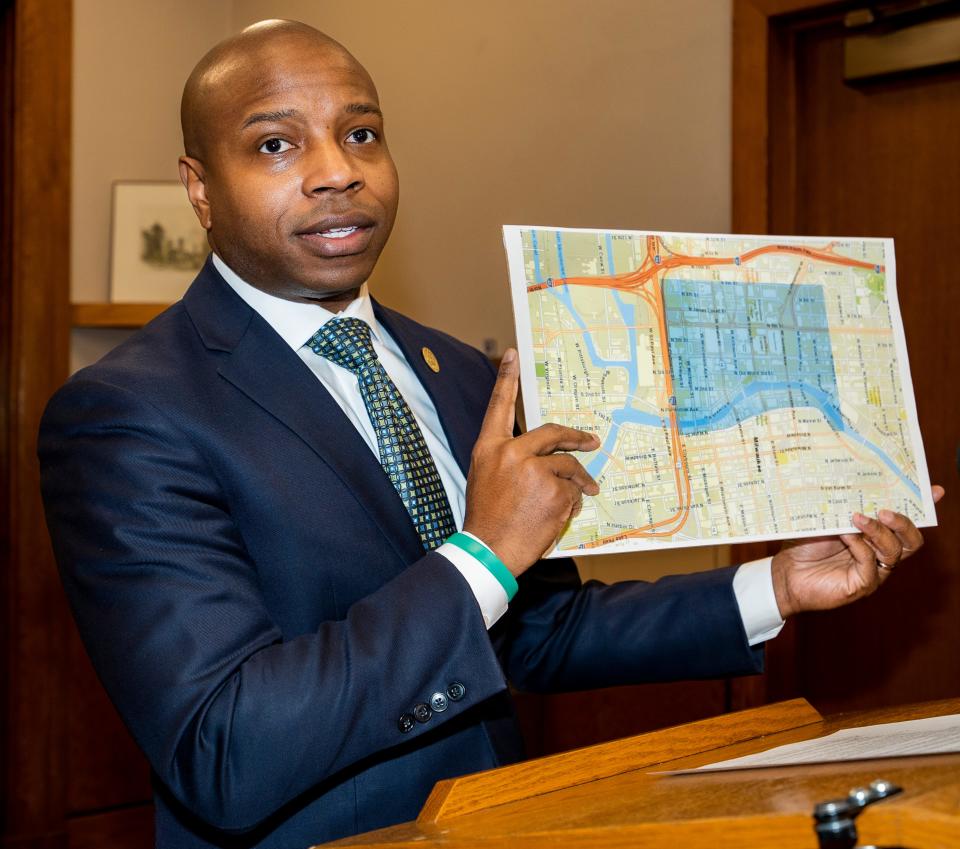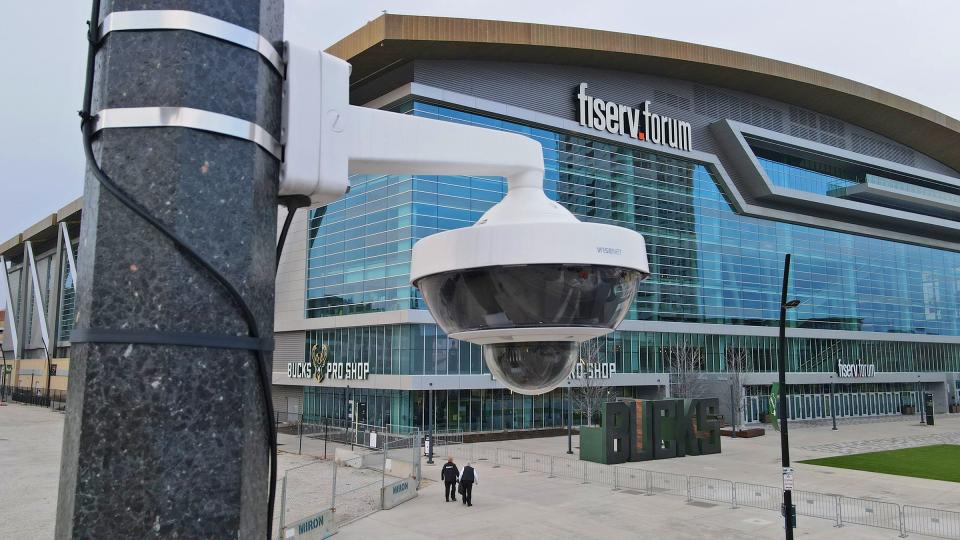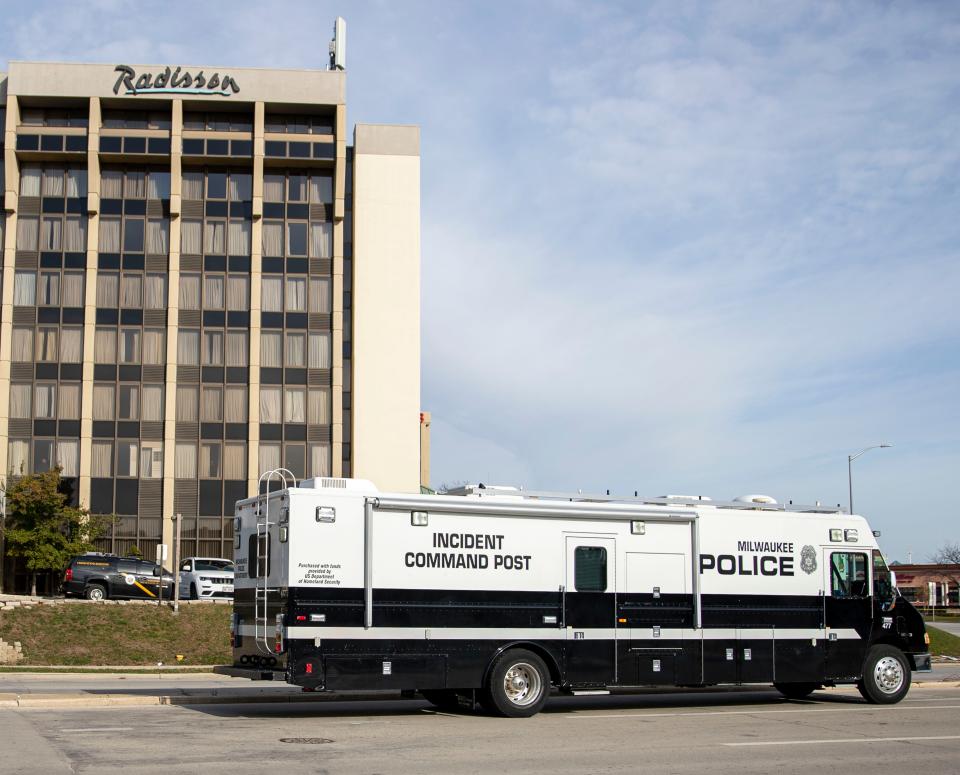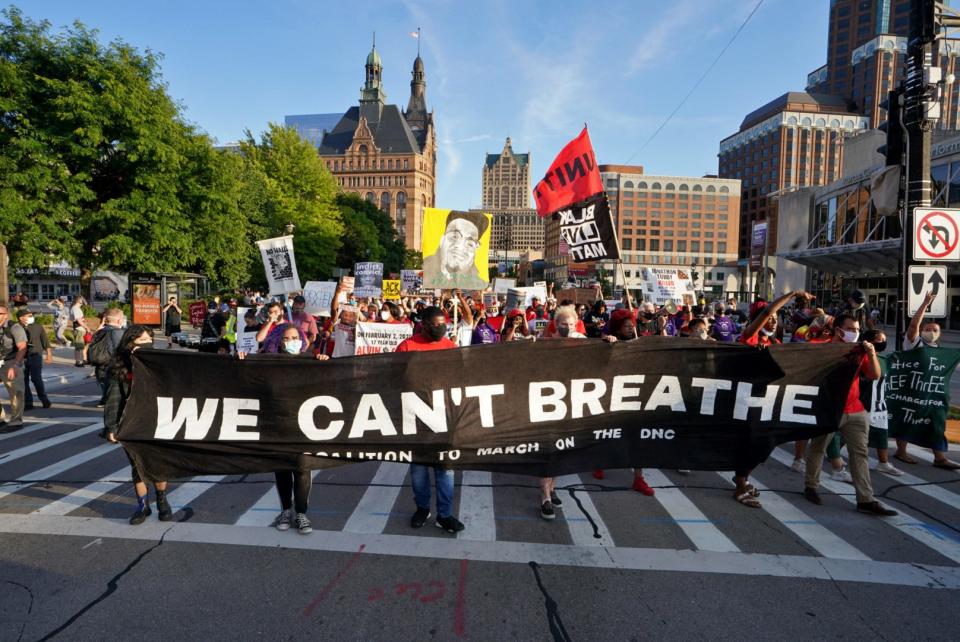Facing list of threats, Milwaukee looks to expand on police, fire equipment for 2024 RNC
At this time in 2020, Milwaukee was gearing up for the Democratic National Convention.
The city's purchases would ultimately include two mobile command posts for police, downtown camera upgrades, a harbor patrol boat and a chemical deployment system that could be used if protesters became "unruly," according to city documents.
Of course, the list of new equipment was smaller than it would have been had the coronavirus pandemic not derailed the plans taking shape. With them went many of the purchases the city intended to make with the $50 million federal security grant long given to cities hosting presidential nominating conventions.
In all, about $4.6 million worth of police and fire equipment was purchased for the DNC, raising questions about how much of that equipment can be repurposed for this summer's Republican National Convention. And even as the city has begun seeking equipment to secure the next major presidential nominating contest, activists and some in City Hall have expressed uneasiness about how the various purchases may be used once the event is over.

Police tasked with preparing for 'highly complex' range of threats
An event like the RNC is always a challenge to plan, but this one will happen "in a highly complex, dynamic and dangerous threat environment," John Cohen, a former acting under-secretary for intelligence and counterterrorism coordinator at the U.S. Department of Homeland Security, told the Journal Sentinel in an interview.
The list of threats is lengthy. They include domestic and international terrorism; politically motivated violence; tension among protesters, law enforcement and counter-protesters; cyber-attacks against election infrastructure and the event itself; and the intentional spreading of misinformation.
The geography of the threats not only includes the downtown security zone but all of Milwaukee and its neighboring cities, Cohen said.
Since the Jan. 6, 2021, insurrection at the U.S. Capitol, Cohen said, the national security community has learned that "local law enforcement authorities can no longer afford not to plan for worst-case scenarios."
"What we've generally learned is that if you fail to plan for the worst case, the worst case will generally happen," he said.
With that in mind, Cohen expects Milwaukee police and federal agencies to prioritize communications equipment to guarantee different agencies are connected, in addition to surveillance technology, such as facial recognition software and license-plate readers.
Milwaukee police declined to comment. The U.S. Department of Justice did not respond to requests for comment.
Milwaukee and Chicago, which is hosting the Democratic National Convention in August, are each seeking $75 million federal security grants ahead of the conventions this summer. The sum is $25 million more than cities have received in the past for hosting the Democratic and Republican presidential nominating conventions.
Mayor Cavalier Johnson said the funding would be used "to make sure we host a safe convention." He added that costs have increased in the many years since the security grants were first provided to host cities, and that funding should keep up.
The grants are included in pending federal legislation.
"I encourage Congress to pass that ... so the Police Department, the Fire Department, other safety agencies have the resources and the manpower they need to have a secure and safe convention here in Milwaukee and Chicago, quite frankly," Johnson said.

In 2020, Milwaukee purchased $4.6 million worth of equipment for DNC
The largely virtual 2020 convention still left Milwaukee with dozens of pieces of equipment for the fire and police departments, according to lists provided by the city Budget Office.
For the Fire Department, the list included kits to treat patients who are having heart emergencies, extrication equipment that can be used in crowded areas and monitors for chemical threats and radiation.
For police, according to the Budget Office, the purchases included:
A tactical "gas delivery system" that would be used "only if protestors become unruly" and "chemical agents" were authorized.
A harbor patrol boat that would monitor for water-related security threats.
Downtown camera upgrades that expanded the coverage of security cameras in the area.
A mobile sky watch trailer that multiple officers could sit in to watch a crowd from 20 feet in the air.
Two "van-style" command posts with three to four computer workstations, used for investigative briefings and long-term command and control of crime scenes.
Some of the purchases in 2020 came as Milwaukee and other cities experienced civil unrest as protests in response to the murder of George Floyd by Minneapolis police spread nationally. How Milwaukee police responded to protesters became a flashpoint in the months before the convention.
Even so, with the city intending to buy the "tactical gas delivery system" and barricades, then-Mayor Tom Barrett called for "peacekeeping" and said he didn't want to be in a situation in which the city didn't have what it needed for the convention.
Ultimately, the pared-down convention amounted to an empty downtown — save for police officers — and protests were peaceful.
Milwaukee plans to reuse whatever equipment possible for Republican National Convention
The city plans to reuse any equipment it can for the convention this summer, said Andrea Fowler, an attorney at the city who handled much of the legal contracting work for the DNC and is now among the key people tasked with planning for the RNC.
"We would reuse everything that we could, just the same way that we would use anything that's in our inventory, and we would only purchase new stuff if we needed to supplement our numbers because our inventory doesn't have enough vehicles or equipment in it to fulfill the needs of the federal security plan," she said.
Cohen expected a decent amount of such equipment would remain useful in 2024, although he noted that communications technology and chemical agents have a shelf life.

So far, planned purchases for Republican National Convention include mobile command post, bicycles
With the RNC just months away, the list of equipment the city is seeking for the convention continues to grow.
Two "hydraulic door breaching tools."
Sixty police bicycles.
One hundred twenty-five chest protectors and 250 Kevlar helmets.
There's also a $1.3 million mobile command post larger than the vehicles of the same name that were purchased four years ago. The vehicle, about the size of an RV, has two meeting areas, multiple monitors to display video of incidents and would be used for executive-level briefings of more than a dozen people, according to the Budget Office.
The purchase was backed by the Common Council and signed by Mayor Cavalier Johnson in January.
Milwaukee police Chief of Staff Heather Hough told the council Jan. 17 the vehicle would be a priority purchase whether the city receives a $50 million or $75 million federal security grant.
Police did not request such a command post for the DNC, Hough said, but its current vehicle is "in dire need of maintenance, technology, all of the things," and it would be expensive to update, she told the council.
She said the devices that keep the command center upright are broken and the internet within the vehicle has not worked at times, forcing police to use cellphone hotspots to try to view body camera and other video footage.
She argued for an event the scale of the RNC — where large crowds and protests are expected and other incidents may happen anywhere in the city — a command post that works is necessary for a safe and secure event.
"If something occurs, we need the ability to strategize and conduct operations from wherever that might be," she said. "The command post allows us that mobility to get there, to set up shop, and to review the things we need to to make those real-time decisions."
Cohen said it is "not surprising" Milwaukee police would want such an item.
"You want to maintain integrity of command," he said. "You want to ensure information sharing."
The department will be able to use the new command post after the RNC, Hough said.
While the majority of council members backed the purchase, many raised questions about how it would be funded if the city did not receive the federal security grant, given the delays already experienced in Congress.
And, in committee, Ald. Marina Dimitrijevic raised concerns about RNC spending for police, saying, "It feels like a militarization just to prepare for a couple days."
Hough responded that the bulk of the costs would be to get additional officers and other people to Milwaukee — housing, per diems and other costs.

Activists wary of surveillance technology and chemical agents
Activists in Milwaukee have kept track of the city's convention purchases this year and from 2020. One of their primary concerns is how technology for surveillance and deploying chemical weapons could be used in the years after the convention.
"It is something that they’re going to have for the continued future and it’s not really necessary in any way, shape or form to have that level of surveillance," said Aurelia Ceja, an organizer for the Milwaukee Alliance Against Racist and Political Repression, which is part of a national organization called the Coalition to March on the Republican National Convention.
She later added, "Tear gas does not help anyone stay safe. When we’re looking at things like that, especially, it’s like, this is not about safety, it’s about suppressing protesters."
Basic issues involving trust with law enforcement play a large role in activists’ concerns.
Ceja and Alan Chavoya, another organizer, said their organizations have held public meetings to plan demonstrations — for which they expect several thousand attendees — and have been willing to share information with law enforcement.
But they said authorities have not reciprocated and a permit to march during the convention has not yet been approved.
Memories of civil unrest in Wisconsin in 2020 also remain fresh in their minds. They recall videos of law enforcement in Kenosha sharing water and words of appreciation with counter protesters during demonstrations against police brutality. In Milwaukee, chemical agents and rubber bullets were used against protesters.
"It’s not just something we’re coming up with," Chavoya said. "We’ve seen them do this to us. We’ve seen them target us. It’s not just an ideological concern. It’s very material, from what they’ve done."
For the RNC, Milwaukee officials have already agreed to suspend the city's controversial policy requiring videos of critical incidents — such as police shootings — be released within 15 days. The policy was crafted to address community concerns about police transparency.
That move came after Police Chief Jeffrey Norman argued the policy would create conflicts with the 4,500-some out-of-city law enforcement expected to help with security. Visiting police for high-profile events are normally required to follow Milwaukee standard operating procedures.
The policy's suspension further reduces trust.
"I think one of the bare minimum things we could ask for is that officers coming into our city are held to the same standards that officers within are city are held to," Ceja said.
Alison Dirr can be reached at adirr@jrn.com. Elliot Hughes can be reached at elliot.hughes@jrn.com.
This article originally appeared on Milwaukee Journal Sentinel: Milwaukee gearing up for RNC after $4.6M spent for DNC equipment

